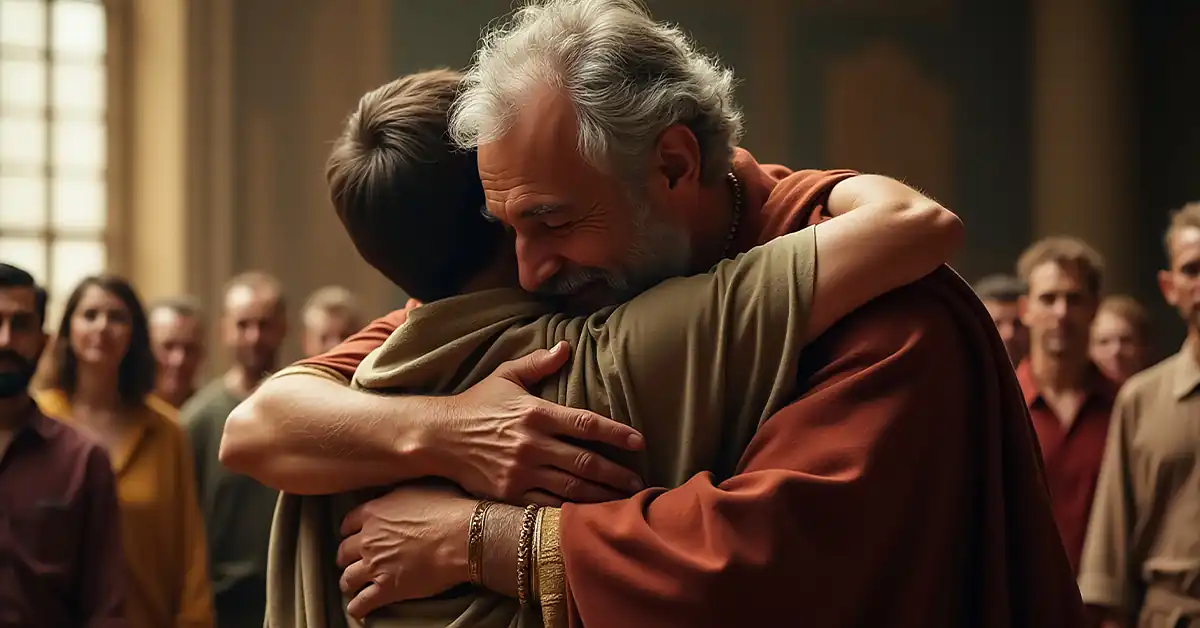FATHER OF ALL not some!

Father of ALL: Introduction
At the center of the gospel is a Father. Not a dictator. Not a distant judge. A Father.
This is not a metaphor. It is the truest truth of all things. The Bible does not merely say God acts like a father. It says He is one, the source from whom every family in heaven and on earth derives its name (Ephesians 3:14–15). And this Father is not tribal, nationalistic, or partial. He is Father of all.
That is why the doctrines of Eternal Conscious Torment (ECT) and Annihilationism are not just flawed theology, they are slander against the very nature of God. These doctrines paint the Father as a monster who tortures or exterminates His own offspring, as if divine love runs out when mercy is refused. But Scripture declares something very different: God is the Father of all creation, and He will not destroy His own inheritance.
“We Are His Offspring”
In Acts 17, Paul addresses a group of pagan philosophers in Athens. These are not covenant Jews. They are not believers. Yet Paul says to them:
“He is not far from any one of us. ‘For in Him we live and move and have our being.’ As some of your own poets have said, ‘We are His offspring.’” (Acts 17:27–28)
This is not flattery. It is revelation. Paul affirms that even idol-worshipping Gentiles are still God’s offspring. They exist in Him. They live because of Him. They belong to Him.
The word “offspring” means what it sounds like, children by origin. We are all born of His breath (Genesis 2:7). We carry His image (Genesis 1:26–27). No amount of rebellion changes that origin.
A Father of All, Not Just Some
Paul says in Ephesians 4:6, “One God and Father of all, who is over all and through all and in all.”
This is not a statement about believers only. It’s a cosmic declaration: God is Father of all.
Malachi 2:10 echoes this:
“Do we not all have one Father? Did not one God create us?”
The prophets didn’t just speak to the righteous. They spoke to the whole house of Israel, faithful and unfaithful alike, and reminded them that God is their Father by creation, even when they had forgotten Him.
God’s Inheritance Is the Nations
Deuteronomy 32:8–9 reveals a powerful truth long buried by poor translation:
“When the Most High gave the nations their inheritance, when He divided all mankind, He set up boundaries for the peoples according to the number of the sons of God. For the Lord’s portion is His people, Jacob His allotted inheritance.”
This passage, when read in light of ancient manuscripts (LXX and Dead Sea Scrolls), shows that God divided the nations under lesser divine beings (the “sons of God”) but kept Israel as His own special portion. However, the end goal was not favoritism, but restoration of all.
Psalm 82 exposes the failure of these divine rulers, “gods” who governed unjustly and without mercy. God declares judgment against them, and then closes the psalm with this cry:
“Arise, O God, judge the earth, for You shall inherit all nations.” (Psalm 82:8)
This is not a statement of current possession, it is a prophetic declaration of what is to come.
And that restoration finds its fulfillment in Psalm 2:8, a direct prophecy about the Messiah:
“Ask of Me, and I will make the nations Your inheritance, and the ends of the earth Your possession.”
This was spoken to the Son, the Christ. God promises not only judgment over the rebellious rulers of Psalm 82, but that He will make the nations the inheritance of His Son. It is not something the nations achieved, it is something God will do.
But what does “inheritance” mean in this context?
Inheritance in the biblical worldview does not simply mean ownership or consumption, it means shared leadership and delegated authority under the dominion of the King. The Most High distributed governance to lesser rulers, but He never ceased to be Sovereign. He remained the Leader of all leadership, the King above all gods, and ultimately the inheritance of the nations means this: they were always His, and they will be brought back under His just and loving rule.
He does not destroy the nations. He inherits them.
They are not burned. They are brought home.
The inheritance of the nations is the restoration of God’s original intent: a world governed by sons and daughters who bear His image, led by the True Son who reconciles all things in heaven and on earth.
The Absurdity of a Father Who Destroys His Own Inheritance
This is where ECT and Annihilationism collapse under their own weight. If all humanity is God’s offspring, and the nations are His inheritance, then what sense does it make for God to burn, torture, or erase what belongs to Him?
Imagine a Father saying, “These are My children, but because they failed Me, I will now light them on fire and keep them alive forever in agony,” or “I’ll simply wipe them out of existence.”
Such a father would be condemned as unthinkably cruel. Yet this is what many believe of the God who is love (1 John 4:8).
Ezekiel 18:4 “Behold, all souls are Mine…”
All souls. Not some. Not the good ones. Not the believers only. All souls are Mine.
Are we really to believe that the God who declares ownership over every soul will turn around and say, “I will torment most of them forever” or “I will destroy what I made in My image”?
The Will of the Father Is Restoration
God’s will is not destruction. It is restoration.
1 Timothy 2:4 “God desires all people to be saved and to come to the knowledge of the truth.”
2 Peter 3:9 “The Lord is… not willing that any should perish, but that all should come to repentance.”
These are not isolated hopes. These are statements of His will. And the will of the Father will not be thwarted.
Jesus Came to Save What Was Lost
When Jesus told the story of the prodigal son (Luke 15), He wasn’t illustrating salvation for a few. He was revealing the Father’s heart toward every lost child. The father in the story never stopped calling the prodigal “son.” He waited. He ran. He embraced. He restored.
That son’s return was not the moment he became a son. It was the moment he realized he had never stopped being one.
God Does Not Give Up on His Children
Jesus taught us to call God “Our Father.” He didn’t say “My Father, but not yours.” He invited us into His relationship with the Father, as sons.
But the gospel does not begin with our faith. It begins with God’s love for His creation. His heart doesn’t begin with the church. It begins with Adam. With breath. With the image of God placed into dust.
Romans 11:36 declares, “From Him and through Him and to Him are all things.”
All things. Not some.
Not the elect only.
Not the deserving.
All things.
And all things will return to Him, not in eternal rebellion or conscious agony, but in worship, healing, and reconciliation.
ECT and Annihilationism Slander the Father
Let’s be clear. These doctrines do more than distort theology. They slander the Fatherhood of God.
ECT teaches that God will keep His children alive forever to torment them because they failed to believe in time.
Annihilationism teaches that God will erase His children permanently, as if their existence was a mistake.
Both portray a Father who cannot heal His family, cannot redeem His image, and ultimately fails to reconcile what He Himself created and called good.
This is not the God revealed in Jesus Christ.
This is not the God who forgave His killers from the cross.
This is not the Father who runs to the prodigal.
This is not the Shepherd who leaves the ninety-nine.
This is not the King who pays the full debt for His servant.
The Father’s House Is for All His Children
The gospel is not a courtroom where a few are pardoned.
It’s a homecoming where every child is welcome.
Luke 3:38 says Adam was the “son of God.”
That means the whole human family began in sonship.
And Jesus came as the “last Adam” to restore what was lost.
He is not ashamed to call us brothers (Hebrews 2:11).
Because we were always His family.
Final Word: He Will Not Burn His Inheritance
The doctrine of Eternal Conscious Torment makes God a Father who tortures His own.
Annihilationism makes Him a Father who destroys what He cannot fix.
But the gospel reveals a Father who rescues all that is His.
He will not torment His offspring.
He will not annihilate His inheritance.
He will not burn His image.
He will not destroy what He formed in love.
“God was in Christ reconciling the world to Himself, not counting their trespasses against them…” (2 Corinthians 5:19)
This is the heart of the Father.
This is the gospel of reconciliation.
This is the destiny of all His children.
- 09/09/2025
- WRITE A COMMENT
Recent Posts
- The Eternal False Translation: How Aionios Was Corrupted Into Eternal
- The Rich Man and Lazarus
- Does Grace Last Forever?
- His Love Never Fails
- Love and Forgive Your Enemies
- His Mercy Endures Forever
- Scriptures That Teach Universal Reconciliation
- The Lesson of James, Peter and John
- Progressive Salvation is Biblical!
- The Gates Never Shut!


